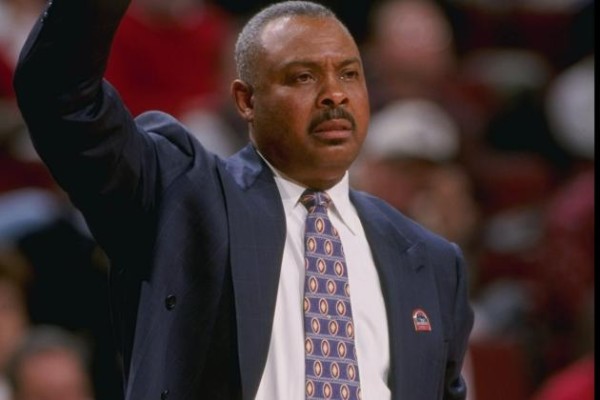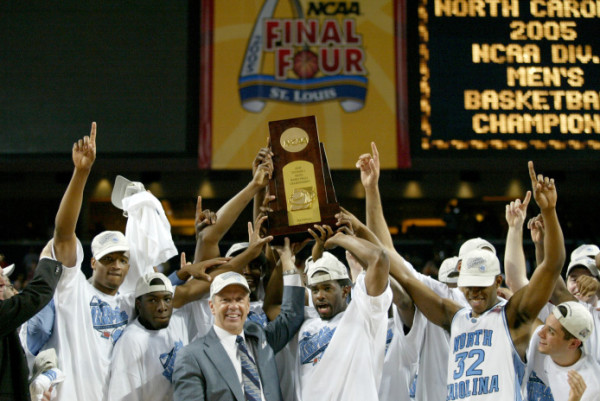Should North Carolina Remove Its 2005 National Championship Banner?
Posted by Brad Jenkins (@bradjenk) on November 11th, 2014On Saturday, Dan Kane of the Raleigh News & Observer posted a follow-up piece on the North Carolina academic/athletic scandal in the wake of last month’s Wainstein Report, a searing description of the details of a “shadow curriculum” that allowed many North Carolina student-athletes over an 18-year period to take fraudulent “paper classes” in order to remain eligible. Kane has been lauded for his investigative reporting since the onset of the scandal several years ago, and his work has been largely vindicated by Wainstein’s findings. In his latest article, Kane reveals that, after reviewing the corresponding documents underlying the report, North Carolina’s 2005 National Championship team made a mockery of the term “student-athlete.”
Kane reports that several key members of that team were free to concentrate on basketball without worrying too much about college classwork, as a total of 35 bogus classes were taken by UNC basketball players during the 2004-05 academic year (that comes out to 2.7 fraudulent classes per scholarship player). Drilling down even further, 26 of those courses were held during the crucial spring semester that included March Madness. It’s reasonable to presume that some players on that team did absolutely no academic work from January-May 2005, which, as Kane suggests, could have given the Tar Heels a competitive advantage over schools with players who were required to attend classes and perform the work that was assigned in them.
As the NCAA continues to sniff around the North Carolina campus, the question becomes what should happen to the 2005 National Championship banner that prominently hangs in the Smith Center? The NCAA will eventually hand out some sort of punishment to the program — presumably — but does the fake-class scheme rise to the level of the organization forcing the school to vacate its appearance in the 2005 NCAA Tournament? No champion has ever lost its title, but let’s look at that possibility. Since the inception of the NCAA Tournament in 1939, the NCAA has vacated 11 Final Four appearances. They are as follows:
- St. Joseph’s, 1961: Three players were involved in a point-shaving scandal.
- Villanova & Western Kentucky, 1971: Each team had a player who had signed a professional contract during the regular season.
- UCLA, 1980: Two players were declared ineligible due to their connection with recruiting violations involving a booster.
- Memphis State (now Memphis), 1985: A player had received $40,000 in illegal payoffs from the head coach.
- Michigan, 1992, 1993: The school vacated the results of 113 games won while four players were ineligible due to improper financial benefits.
- Massachusetts, 1996: A player had accepted money and gifts from a pair of sports agents.
- Minnesota, 1997: An academic scandal involving the head coach, five other university employees, and at least 18 players.
- Ohio State, 1999: A player was ruled retroactively ineligible due to improper financial benefits.
- Memphis, 2008: Its entire 2007-08 season was vacated by the NCAA due to an invalidated SAT score for a player.
In most of the above cases, the school was penalized for non-academic issues. In fact, the only previous situation that looks remotely similar to this is the 1997 Minnesota scandal. In that case, the NCAA found that significant levels of academic fraud took place to help Golden Gophers’ basketball players maintain their eligibility. While that generally sounds like what was happening in Chapel Hill, there are some notable differences. In Minnesota’s case, the fraud was orchestrated by the academic counselor to the men’s basketball team, and the head coach, Clem Haskins, was found to have been complicit in those activities, giving benefits to those who did the players’ coursework. At North Carolina, the scheme was initially begun by administrative personnel outside of athletics, and thus far there is no evidence that connects Roy Williams (or any former UNC coach) to the bogus-class scam. It’s also worth noting that the NCAA uncovered additional improper benefits, including cash payments to players and recruits, while investigating the Minnesota case. The school imposed pecuniary sanctions on the basketball program following its own internal investigation, but the NCAA added even more penalties, ultimately deciding to vacate three of its NCAA Tournament appearances including the 1997 Final Four. After reviewing the details of the Minnesota case as a comparison, there really is no clear precedent for how the NCAA will deal with North Carolina’s unique circumstances.

Clem Haskins coaching career was ruined by the Minnesota academic scandal in the 90s.
(Jonathan Daniel/Getty images)
Although the infraction details are totally different, the vacated appearance by 1980 UCLA raises an interesting parallel with respect to the role of legendary coaches at both schools. Roy Williams has vehemently defended his reputation throughout the scandal — and to be clear, he has not been implicated of any wrongdoing — but the “paper class” fraud will undoubtedly be part of his career narrative when his coaching days are over. Relatedly, the booster behind UCLA’s probation, Sam Gilbert, not only supplied the cash and other improper benefits that got head coach Larry Brown in trouble in the early 1980s, but it is now well-known that Gilbert had been doing so for years dating back to the John Wooden era in Westwood. This 2010 L.A. Times piece on the subject includes the following tidbit:
Times reporters Mike Littwin and Alan Greenberg opined:
…Wooden knew about Gilbert. He knew the players were close to Gilbert. He knew they looked to Gilbert for advice. Maybe he knew more. He should have known much more. If he didn’t, it was only because he apparently chose not to look.
Compare with this quote from a recent CBSSports.com article written by Gary Parrish after he attended ACC Operation Basketball last month:
…and I’m compelled to tell you that I pulled three different ACC coaches aside, offered anonymity and asked if there’s any way their players could for years be involved in no-show classes without them knowing. All three, without hesitation, said the only way a head coach at this level wouldn’t know is if he went out of his way to not know, point being that Williams’ colleagues don’t seem to think he’s nearly as naive as Williams would like the rest of the world to believe.
There is a striking similarity in these two quotes, both highly suggestive that Williams and Wooden either knew or should have known what was going on right under their noses. Although Wooden’s narrative has been set, it will be interesting to view how Williams pushes back against such allegations throughout the remainder of his career.
North Carolina’s institutional reputation has taken a major hit, not only with its obvious improprieties but also in the self-preserving manner by which the school appears to have handled things. The administration at first denied any connection between the academic and athletic sides of the fraud, and then it attempted to discredit whistleblowers like former employee Mary Willingham and Kane. It has taken several years to get there, but the public now sees a different, repentant university administration. Chancellor Carol Folt is faced with the unenviable task of instituting remedial actions and controls while awaiting the NCAA’s ultimate decision. Some of the school’s house has already been cleaned, but one of the big upcoming decisions will relate to that giant piece of Carolina Blue cloth hanging high above the floor in the Smith Center. By taking a proactive approach to remove it before the NCAA forces the school’s hand, Holt would send a powerful message to the world that the University of North Carolina places its academic integrity as an institution of higher learning above the hallowed but now-stained tradition that is North Carolina basketball.











































